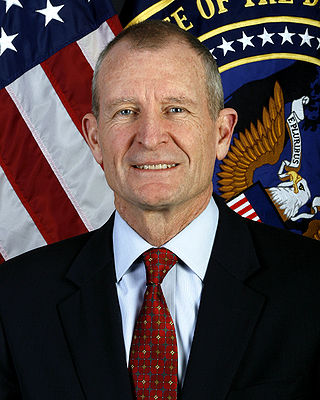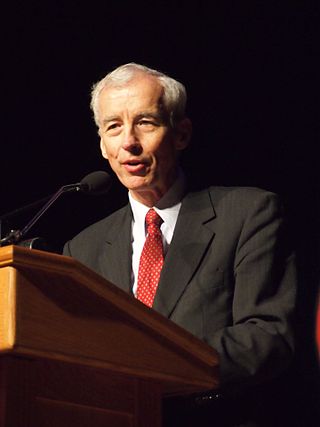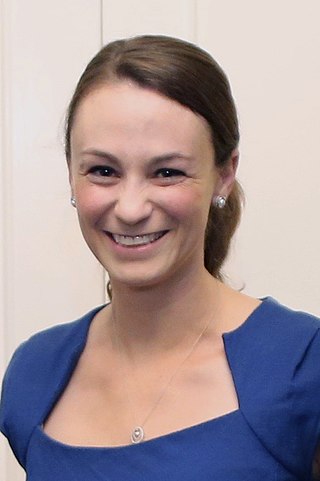Related Research Articles

Allen Welsh Dulles was an American lawyer who was the first civilian Director of Central Intelligence (DCI), and its longest serving director to date. As head of the Central Intelligence Agency (CIA) during the early Cold War, he oversaw the 1953 Iranian coup d'état, the 1954 Guatemalan coup d'état, the Lockheed U-2 aircraft program, the Project MKUltra mind control program and the Bay of Pigs Invasion in 1961. As a result of the failed invasion of Cuba, Dulles was fired by President John F. Kennedy.

The Council on Foreign Relations (CFR) is an American think tank specializing in U.S. foreign policy and international relations. Founded in 1921, it is an independent and nonpartisan nonprofit organization. CFR is based in New York City, with an additional office in Washington, D.C. Its membership has included senior politicians, numerous secretaries of state, CIA directors, bankers, lawyers, professors, corporate directors and CEOs, and senior media figures.

John Dimitri Negroponte is an American diplomat. In 2018, he was a James R. Schlesinger Distinguished Professor at the Miller Center for Public Affairs at the University of Virginia. He is a former J.B. and Maurice C. Shapiro Professor of International Affairs at the George Washington University's Elliott School of International Affairs. Prior to this appointment, he served as a research fellow and lecturer in international affairs at Yale University's Jackson Institute for Global Affairs, United States Deputy Secretary of State (2007–2009), and the first ever Director of National Intelligence (2005–2007).

George Frost Kennan was an American diplomat and historian. He was best known as an advocate of a policy of containment of Soviet expansion during the Cold War. He lectured widely and wrote scholarly histories of the relations between the USSR and the United States. He was also one of the group of foreign policy elders known as "The Wise Men".

Containment was a geopolitical strategic foreign policy pursued by the United States during the Cold War to prevent the spread of communism after the end of World War II. The name was loosely related to the term cordon sanitaire, which was containment of the Soviet Union in the interwar period.

The "X Article" is an article, formally titled "The Sources of Soviet Conduct", written by George F. Kennan and published under the pseudonym "X" in the July 1947 issue of Foreign Affairs magazine. It widely introduced the term "containment" and advocated for its strategic use against the Soviet Union. It expanded on ideas expressed by Kennan in a confidential February 1946 telegram, formally identified by Kennan's State Department number, "511", but informally dubbed the "long telegram" for its size.

Dennis Cutler Blair is the former United States Director of National Intelligence and a retired United States Navy admiral who was the commander of U.S. forces in the Pacific region. Blair was a career officer in the U.S. Navy and served in the White House during the presidencies of both Jimmy Carter and Ronald Reagan. Blair retired from the Navy in 2002 as an Admiral. In 2009, Blair was selected as President Barack Obama’s first Director of National Intelligence, but after a series of bureaucratic battles, he resigned on May 20, 2010.

Paul R. Pillar is an academic and 28-year veteran of the Central Intelligence Agency (CIA), serving from 1977 to 2005. He is now a non-resident senior fellow at Georgetown University's Center for Security Studies, as well as a nonresident senior fellow in the Brookings Institution's Center for 21st Century Security and Intelligence. He was a visiting professor at Georgetown University from 2005 to 2012. He is a contributor to The National Interest.
Robert L. Suettinger is an American international relations scholar currently serving as a senior advisor at The Stimson Center and an advisor to the Inter-Parliamentary Alliance on China (IPAC). He was national intelligence officer for East Asia at the National Intelligence Council (NIC) from 1997 to 1998 during the Clinton administration. While there, he oversaw the preparation of national intelligence estimates for the director of the Central Intelligence Agency. His areas of specialty are the People's Republic of China and the North Korean nuclear weapons program.

The National Counterintelligence and Security Center (NCSC) leads national counterintelligence (CI) for the United States government. It is part of the Office of the Director of National Intelligence (ODNI).

Bruce O. Riedel is an American expert on U.S. security, South Asia, and counter-terrorism. He is currently a senior fellow in the Saban Center for Middle East Policy at the Brookings Institution, and a professor at Johns Hopkins School of Advanced International Studies. He also serves as a senior adviser at Albright Stonebridge Group.

Ray Steiner Cline was an official at the United States Central Intelligence Agency and is best known for being the chief CIA analyst during the Cuban Missile Crisis.
Michael Dalzell Swaine is an expert in China and East Asian security studies. Swaine is a senior research fellow at the Quincy Institute for Responsible Statecraft. Prior to joining the Quincy Institute, Swaine was a Senior Associate in the Asia Program at the Carnegie Endowment for International Peace. Before joining the Carnegie Endowment as co-director of the China Program in 2001, Swaine worked for 12 years at the RAND Corporation, where he was appointed as the first recipient of the RAND Center for Asia-Pacific Policy Chair in Northeast Asian Security.
Bonnie S. Glaser is managing director of the Indo-Pacific Program at the German Marshall Fund of the United States. She was previously a senior adviser for Asia and the founding director of the China Power Project at the Center for Strategic and International Studies. Glaser is also a non-resident fellow with the Lowy Institute in Sydney, a senior associate with CSIS Pacific Forum, and a consultant for the U.S. government on East Asia. Glaser writes extensively on Chinese policy, including its foreign and military policy towards the United States., Cross-Strait relations, China's relations with Japan and Korea, Chinese perspectives on missile defense, and multilateral security in Asia.

Sheena Elise Chestnut Greitens is an American political scientist currently serving as an associate professor in the Lyndon B. Johnson School of Public Affairs at the University of Texas at Austin. She was First Lady of Missouri from 2017 to 2018.

Thomas J. Christensen is an American political scientist. He is the James T. Shotwell Professor of International Relations at the School of International and Public Affairs, Columbia University.
Rush Doshi is an American political scientist. He served at the White House National Security Council in the Biden administration as Director and later Deputy Senior Director for China and Taiwan from 2021 to March 2024.

Richard Fontaine is an American foreign policy analyst currently serving as CEO of the Center for a New American Security (CNAS).
Dennis Craig Wilder is a former senior American intelligence official currently serving as a professor of practice at Georgetown University's School of Foreign Service and a senior fellow of Georgetown's Initiative for US-China Dialogue on Global Issues, where he previously served as managing director. He is a member of the National Committee on US-China Relations.
David O. Shullman is an American political scientist currently serving as Senior Director of the Atlantic Council's Global China Hub, leading the think tank's work on China, as well as an adjunct professor at Georgetown University. Previously he was a Senior Adviser overseeing democratic resilience building against authoritarian influence at the International Republican Institute between 2018 and 2021 and Deputy National Intelligence Officer for East Asia at the National Intelligence Council between 2016 and 2018.
References
- 1 2 3 "Paul Heer". globalaffairs.org. 2023-09-05. Retrieved 2023-09-10.
- ↑ "Dr. Paul Heer (History MA, 1982) - The Challenge from China: What Would Kennan Do?". events.uiowa.edu. Retrieved 2023-09-10.
- ↑ Apostoaie, Ella (2023-01-23). "Paul Heer on The Danger of Overstating China's Ambitions". The Wire China. Retrieved 2023-09-10.
- ↑ "DNI Names New National Intelligence Officer for East Asia" (PDF). OFFICE OF THE DIRECTOR OF NATIONAL INTELLIGENCE PUBLIC AFFAIRS OFFICE. May 16, 2007. Retrieved September 9, 2023.
- ↑ "Executive Roundtable with Paul Heer". Asia Society. Retrieved 2023-09-10.
- ↑ "Mr. X and the Pacific: George F. Kennan and American Policy in East Asia". EastWest Center. Retrieved September 9, 2023.
- ↑ "Strategic Implications Of The Rise Of China: A Washington Perspective | Institute of International Studies". iis.berkeley.edu. Retrieved 2023-09-10.
- ↑ "Recent national intelligence officer joins CIS | MIT Center for International Studies". cis.mit.edu. Retrieved 2023-09-10.
- ↑ "Paul Heer Joins the Center for the National Interest – Center for the National Interest". cftni.org. Retrieved 2023-09-10.
- ↑ "Mr. X and the Pacific by Paul J. Heer | Hardcover". Cornell University Press. Retrieved 2023-09-10.
- ↑ Heer, Paul J. (2018). Mr. X and the Pacific: George F. Kennan and American Policy in East Asia. Cornell University Press. doi:10.7591/j.ctt1w1vkcn. ISBN 978-1-5017-1117-6.
- ↑ "Paul Heer comments on George Kennan's Impact on American Policy in East Asia | Elliott School of International Affairs | The George Washington University". Elliott School of International Affairs. Retrieved 2023-09-10.
- ↑ Heer, Paul (2023-09-25). "Hostility Between the United States and China Looks Increasingly Inescapable". The National Interest. Retrieved 2024-01-29.
- ↑ Swaine, Michael D.; Vogel, Ezra F.; Heer, Paul; Roy, J. Stapleton; Odell, Rachel Esplin; Mochizuki, Mike; Goldstein, Avery; replies, Alice Miller; Aaron L. Friedberg (2020-10-23). "The Overreach of the China Hawks". Foreign Affairs. ISSN 0015-7120 . Retrieved 2023-09-10.
{{cite news}}: CS1 maint: multiple names: authors list (link) - ↑ "Are Chinese and American Interests Mutually Exclusive in Eurasia? - Foreign Policy Research Institute". www.fpri.org. Retrieved 2023-09-10.
- ↑ Heer, Paul (2000-07-01). "A House United". Foreign Affairs. No. July/August 2000. ISSN 0015-7120 . Retrieved 2023-09-09.